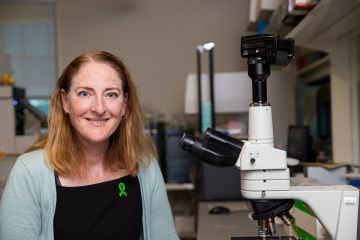When doctors see big data
- Kate Hildebrandt

New cancer screening methods use automated visual data for faster diagnosis, more accurate care.
UVic health informatics graduate student Amr Farghali has developed a tool to help visualize vast amounts of patient data—improving the speed and accuracy of cancer diagnosis.
“The human brain interprets visual images faster than text,” says Farghali, who works full-time as a senior pharmacist. Farghali decided to redirect his medical science career to where the need was greatest: providing cancer specialists with faster, more efficient screening methods.
Now a master’s student with UVic’s School of Health Information Science (HINF), Farghali is completing the Visual and Automated Disease Analytics program—a joint initiative between the University of Manitoba and UVic, funded by the Natural Sciences and Engineering Research Council of Canada—in support of his PhD thesis. This program provides students with the techniques and tools to collect, analyze and visualize chronic and infectious disease data.
Translating data into visuals heightens understanding that can improve the quality and speed of screening and diagnostics, improving outcomes for patients.
Farghali focused on colorectal cancer, one of the top three most common and most deadly cancers in Canada. Colorectal cancer can advance quickly with little or no signs of a problem. Farghali noted there were too many false positives, comprised further by a shortage of specialists across the profession.
A 2019 report by the Canadian Cancer Society says nearly 30% of colorectal cancers in Canada are diagnosed at stage three—with 20% diagnosed at stage four.
“That’s too late,” says Farghali, as the stage four survival rate is less than 15%. “That rate stands at 90% if colorectal cancer is found at stage one.”
Deeply familiar with health and wellness, Farghali, 40, is from Cairo, Egypt, where he retired from professional soccer following a knee injury. Competition for employment and higher education is fierce, he says, given Cairo’s population of 40 million. Already a licensed pharmacist, Farghali chose to continue his studies in Canada.
“We find the world of informatics is revolutionizing all areas of health,” says HINF Director Andre Kushniruk. “Not only are physicians and nurses gaining new abilities, pharmacists and other clinicians are are improving their capabilities with the latest informatics technologies.”
Scheduled to complete in August 2020, Farghali chose to do his internship with Victoria’s Pacific Digestive Health, a clinic run by 13 gastroenterology specialists. This was a perfect match as Farghali needed their support to develop a workflow tool that would enable the visualization of vast amounts of select data.
Farghali predicts the emergence of artificial intelligence will further drive improvements in health care with its heightened visualization of analytics. Learning and applying algorithms, as Farghali is now doing in his VADA studies, offers an even more precise, more accurate picture of what the data says, offering unprecedented insights into diagnostics, care processes, treatment variability, and patient outcomes.
“That’s exactly what I wanted my application to do,” says Farghali. “By showing a wide range of variables, I can present various diagnostic possibilities that would enable medical professionals to allocate their resources more effectively.” Doing so, he says, saves valuable time.
“Amr’s knowledge of health informatics, data visualization and data analytics will advance the science in cancer care,” says Elizabeth Borycki, HINF professor.
Farghali’s thesis goal is to develop a sophisticated automated screening application where samples of colorectal diagnostics can be matched using visual data. An automated application would not only speed up the diagnostic process, it would also offer a higher level of accuracy.
“Outcomes are profoundly impacted when we treat any form of cancer in its earliest stages,” he explains with concern for colorectal patients in Victoria waiting weeks, even months, for appointments to see specialists and for feedback on test results. “With these new technologies, we expect to see positive changes and improved patient outcomes.”
Photos
In this story
Keywords: health, cancer, research
People: Amr Farghali
Publication: The Ring






